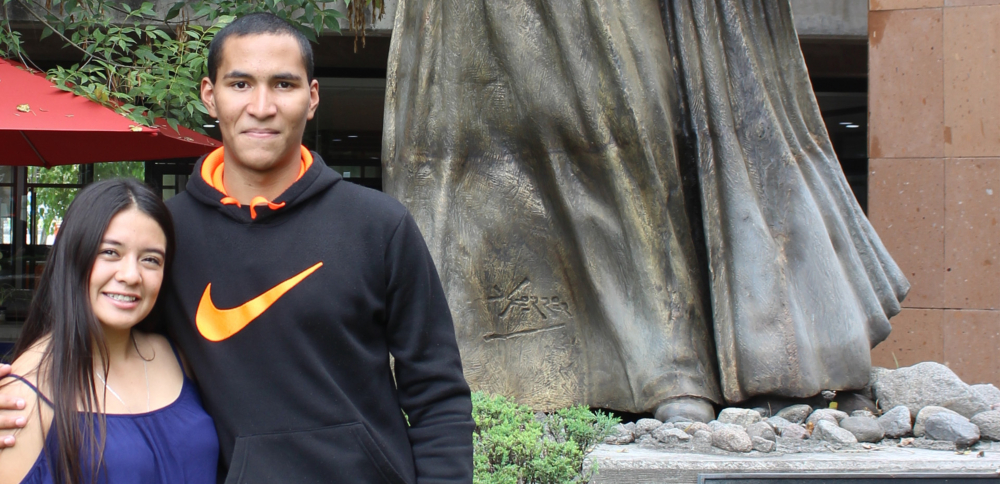
Two participant students at Universidad Iberoamericana Puebla. Photo by: Universidad Iberoamericana Puebla.
EDITOR’S NOTE: We asked Susana del Carmen Ditrolio, AUSJAL Executive Director, to share a short report about this scholarship program, its pilot experience and her vision for the future.
In 2018, the Association of Universities Entrusted to the Society of Jesus in Latin America (AUSJAL) launched its “Incentive Scholarship Program for Student Mobility”, a multilateral agreement of student exchange. The Program was designed by the AUSJAL Network of Peers on Academic Cooperation and Interinstitutional Relations (CARI), and is currently coordinated by the Pontifical Javeriana University Cali (Colombia).
Last fall, the pilot edition of the Program began with 18 AUSJAL universities, from 11 Latin American countries. During the Program, the selected students are exempted of all tuition and fees payments for the semester they study abroad, both in their home institution and the host one. Most of the participating universities awarded a scholarship that financed the total cost of the student's accommodation and food expenses during the academic exchange. The program is designed so that the students can use their tuition money to finance their airplane tickets and the costs involved with getting their visa and international health insurance. Some participating institutions decided to grant more than one scholarship, and even some of them granted five scholarships.
The 18 participating institutions were: Rafael Landívar University (Guatemala), Antonio Ruíz de Montoya University (Peru), Pacific University (Peru), Vale do Rio dos Sinos University-UNISINOS (Brazil), Pontifical Javeriana University Cali (Colombia), Pontifical Javeriana University Bogotá (Colombia), Iberoamericana University Mexico City, Iberoamericana University Puebla (Mexico), Iberoamericana University León (Mexico), ITESO (Mexico), Andrés Bello Catholic University (Venezuela), Pontifical Catholic University of Ecuador, UCA University (Nicaragua), Cordoba Catholic University (Argentina), Catholic University of Uruguay, José Simeón Cañas University (El Salvador), Loyola Institute of Higher and Specialized Studies (Dominican Republic) and Alberto Hurtado University (Chile).
The pilot experience of the AUSJAL Scholarship Program was highly positive. The CARI Network of Peers is currently working on an instrument to evaluate the impact of the Program. The most important difficulty detected by the CARI peers responsible for the implementation of the Program was the organization of the student mobility based on the "one by one" principle. Even though it is desirable that the participating universities send and host the same number of students, the differences between the AUSJAL universities do not always allowed complying with this principle. Therefore, in order to maximize student mobility, and without changing the character of the Program, the universities are evaluating the possibility of implementing an adjustment to allow that those participating institutions that are willing can host more students than number they send to other universities during the semester.
The CARI Network have prepared all the process necessary for the second edition of the Program, which will take place during the first semester of 2019. Up to now, there are 14 AUSJAL universities that will participate in the Program and grant a similar number of scholarships.
The AUSJAL Scholarship Program shows that based on the spirit of Jesuit collaboration and networking, and with the right organization and procedures, it is possible to develop new academic exchange experiences that enrich the international formation of our students and do not necessarily compete with existing exchange agreements signed by our universities.
Even though there are significant differences among Jesuit universities worldwide, the lessons learned from the AUSJAL Scholarship experience could be useful in carefully moving towards the development of a global exchange program among Jesuit universities, such as the "Magis Exchange Agreement", which was presented in the 2018 IAJU Assembly in Deusto. As the AUSJAL experience also shows, in order to manage all the variables, financing and complexity of an international exchange program, this global project could start with a pilot experience among some universities from each of the six regional conferences and, for instance, focuses on the mobility of students during short academic periods. The potential and educational enrichment that scholarships exchange programs like the AUSJAL experience and the Magis Exchange offer are enormous. Now is the time to carefully discern, plan and implement together regional and global programs that strengthen the formation of our students as global citizens.
See also:
AUSJAL - Red CARI apuesta al intercambio academico en America Latina.
